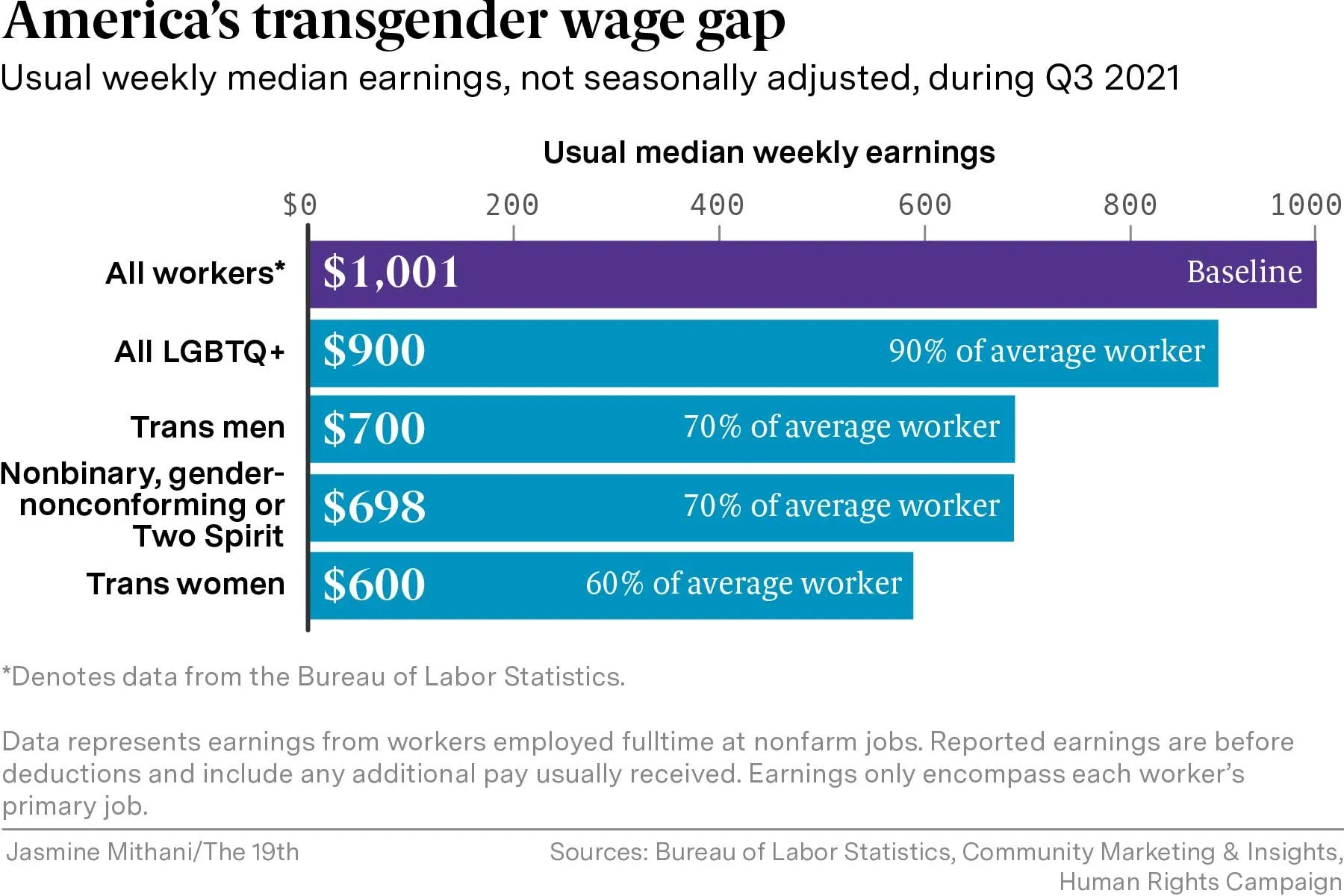Transgender and gender-nonconforming people are among the lowest paid LGBTQ+ people working full time in the United States, according to a snapshot poll by the Human Rights Campaign Foundation and a California-based market research firm.
The HRC found that trans men and nonbinary or gender-nonconforming people earn 70 cents for every dollar the typical worker earns, while trans women earn 60 cents to that dollar, based on responses from roughly 6,800 LGBTQ+ workers last spring.

“If that’s across the entire population, those dollars and cents add up,” said Spencer Watson, executive director at the Center for LGBTQ Economic Advancement & Research.
The HRC believes the actual pay gap for trans and LGBTQ+ people is bigger because part-time jobs and work in underground economies were not considered. But the survey still offers a unique look at wage disparities that experts say have not been adequately researched.
Trans people experience widespread unemployment and poverty at higher rates compared to the rest of the U.S. population. Even if a trans person does get a job outside of the underground economy, discrimination can still take its toll and stunt economic advancement, said Josie Caballero, survey project manager of the U.S. Transgender Survey (USTS).
More than 77 percent of respondents to the 2015 USTS — the most comprehensive survey of trans life and the latest data available ahead of the survey’s planned 2022 release — described taking multiple steps to avoid discrimination at work, like hiding their gender identity, delaying their transition and being misgendered without correcting their employer.
“If you’re just trying to avoid discrimination, you’re not you’re not asking for promotions,” Caballero said. “You’re not trying to seek quality of life. You’re just trying to survive and keep your head down.”
The wage gaps, Caballero said, “kind of confirm what we already know.”
As researchers investigate the economic disparities faced by trans people, they should be focused on what kind of wage gap trans women of color experience in the United States, said Lourdes Ashley Hunter, executive director of the Trans Women of Color Collective. Researchers also need to account for underground economies and sex work in order to gain a full picture of the economic disparities that most sharply harm trans women of color, who also face disproportionate violence and multiple forms of discrimination, Hunter said.
In the formal economy, how a company is structured to support Black trans women and other women of color is also key to their economic opportunities, Hunter said. Are managers hiring only one or a few trans people? Are there trans people of color in leadership? Is the company paying a living wage? And even if a Black trans person is making a living wage — how long were they in poverty before that?
The HRC’s polling analyzed the reported wages of LGBTQ+ women of color, though a wage gap for trans men and trans women of color was not measured due to a lack of data. The organization hopes to release another report focused on Black and Latinx trans people from the same data used in this report, Shoshana Goldberg, the organization’s director of public education and research, said.
“We’re only just now being able to start to uncover a lot of these economic disparities,” she said.
Although trans women in HRC’s poll were the lowest paid of any group, cisgender queer women who responded to the survey also shared gaps in pay. However, data from the UCLA’s Williams Institute indicates a more complicated financial picture for cisgender bisexual and lesbian women. Cisgender lesbian and bisexual women face significant discrimination and economic stress, and queer women of color are significantly more likely to have very low household incomes compared to White women, according to the Williams Institute at the UCLA School of Law.
But, comparing cisgender queer women’s wages to straight women’s wages is more complicated, said M.V. Lee Badgett, economics professor and distinguished scholar at the Williams Institute.
Cisgender lesbian and bisexual women on average make more money than straight women, Badgett said, for a variety of reasons, including working more hours and working more weeks of the year — which can be influenced by relationship structure and a lack of child care. However, they make less on average than bisexual and gay cisgender men, she added. Recent data from the Hamilton Project also found that married women couples tend to bring home lower wages than an opposite-gender married couple.
Sixteen percent of trans people surveyed by USTS were either making less than $10,000 per year in 2014 or had no income. As the census’ Household Pulse Survey gathers information on how Americans are faring during the pandemic — recently including LGBTQ+ people in the count — researchers are learning that trans people are currently still more likely to have household incomes that put them below the federal poverty line, said Kitt Carpenter, labor economist and founder of the Vanderbilt LGBT Policy Lab.
Investigating a potential trans wage gap presents a new area for researchers to articulate the day-to-day economic disparities of trans people, in line with discussions on the racial wage gap and gender wage gap in the United States, Watson said.
And at the end of the day, researchers are “only beginning to scratch the surface” of the experiences of trans people and other gender minorities, and that understanding is much further behind research on LGBTQ+ people as a whole, Carpenter said.
“But thankfully, we’re moving in the right direction,” he said.






